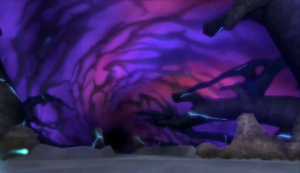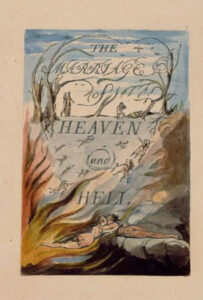The opening of the great Dhammapada, or the Law of Illumination, states that what the mind focuses on determines its reality. Anger is included here as being most dominant—as The Dhammapada in Light of the Unborn says, “hate is not pure but draining, indeed it is Mind turned against itself. Being free from hate and all abusive thoughts is the beginning of purification and the embrace of sweet peacefulness.” Zuowang paints a similar formulation when it comes to being tangled up in emotional affairs:
Don’t let them become an obstruction or allow your mind give rise to anger and impatience. As soon as you give rise to anger and impatience because of some affair [YQ: you see affairs as affairs], the mind will be sick with agitation. How then can it be called a mind at peace? (ibid, pg. 149)
Anger itself is an attribute of those emotional affairs that cling to the mind like paste. One must become freed from those pugnacious emotive energies, that’s why within Daoism as well as Unborn Mind Zen practice must commence in taming the erratic mind—above all this occurs through detachment. Bringing the mind to a complete STOP or quiescent stillness. Zuowang insists that there be no desires left in any form so that “the wondrous may be observed.” Disturbing fantasies must likewise be allayed:
Any confused deviance or disturbing fantasy should be eliminated as soon as one becomes aware of it. Upon hearing slander or praise, or anything good or bad, one should just radically cut it all out and not admit it into the mind at all. This is because if anything is taken in, the mind will be full. With a full mind, Dao has no place to go. Whatever one may see or hear, it should be like one had not seen or heard at all. Then right and wrong, good and evil cannot enter the mind. (ibid, pg. 144)
This reminds me of an incident that occurred recently during my trip to the dentist office. While sitting in the chair (they were repairing a chipped tooth) the accompanying assistant, a young woman in her early twenties, began softly singing to a song on the radio whose music was being piped into the room. The melodious sound of her voice gave rise to imaginings of me resting my head on her breast becoming immersed in her sweetness. In point of fact she was leaning in so that her breasts actually brushed up against my shoulder. Occurrences like these can occur on the spur of the moment when being enticed with sensual allures—they happen spontaneously without prior warning. The Dao would say just go along with the flow, but not to become permanently attached to the feelings; never jeopardize your stability when assaulted by them. This can happen so easily, especially during this festive season of the year when emotions are running amok with the focus on warmth and family. Always recollect that stability is key.
Remaining in stability without movement, full of insight without using it is not tempting Dao. It allows the attainment of deep purity and perfect constancy. The Zhuangzi says: “To know Dao is easy–to keep from speaking about it is hard. To know and not to speak, this gets you to the heavenly part. To know and to speak, this gets you to the human part. Men of old looked out for the heavenly, not for the human”. (ibid, pg. 154)
Yea, those ancient poets sung of the divine and belittled the petty emotions of people. In our dharma ending age the opposite is in effect—the divine becomes drowned in emotions. Further intimations describe the movement between the Nine Realms of Darkness and the Threefold Heavens.
On the other hand, one should continue to “diminish, forsake, purify, and cleanse the mind.” This will lead to a perfect stability of mind, one will be unperturbed even by “sudden clashes of thunder.” As a result, “unmoving in the stillness, one will imperceptibly enter enlightenment.” In addition to this outline of what one has to do, some explanations on the nature of the human mind are given. The mind is inscrutable, never to be grasped or understood, it is extremely powerful in its manifestations such as anger or goodwill, hatred or benevolence. It reaches through the eight directions, can be anywhere and nowhere, and it is never far-off the Ninefold Darkness below or the Threefold Clarities above. (ibid, pg. 98)
The nine realms of darkness (jiuyou 九幽) are the hells or earth prisons (diyu 地獄) in the underworld. The Three Heavens (santian 三天) are the original levels of creation, mysterious, primordial, and beginning (xuan yuan shi 玄元始) qi. This brings to mind William Blake’s epic poem: The Marriage Of Heaven and Hell.
His poem sings that Heaven and Hell are just different kinds of energies, like the Dao Yin/Yang and both are needed to keep the universe going. The preface to the actual “text” of the Zuowang elaborates:
Preface by the Recluse Zhenjing
When Heaven and Earth first separated and the three powers took their positions, humanity’s place was in the center between Heaven and Earth with the five qi coming together to form people’s body-self. Therefore they could live long. Later, however, people obscured their inner nature, subdued their spirit, constricted their qi, and wasted their essence. For this reason their lives were no longer in harmony with Heaven and Earth; on the contrary, they accepted their crippled shortness [of life] and were sweet in their hearts about it. (ibid. pg. 137)
The Daoist mindset reveals the ebb and flow of the Dao itself:
“Without haste it is swift, without being summoned it arrives” In a state of anger it will hit the center of a stone, arrow and feathers. In a state of grudge it will make it freeze in the heat of summer. Unleashing hatred it gets near the nine realms of darkness. Accumulating benevolence, how could it be far off the Three Heavens? It comes and goes abruptly, whether agitated or calm cannot easily be told. Sometimes it’s there, sometimes it’s gone. Neither milfoil nor tortoise shells could divine it. (ibid, pg. 155)
We should bring to mind here the Hamlet Act III illustrious line: “The slings and arrows of outrageous fortune.” One is not at fault when misfortunes befall them since the Muse of Fortune knows no favorites but instead slings those arrows hurriedly and without remorse. The wheel of the Dao spins as it does with no particular aim in sight—it spins by way of happenstance and nothing will stand in its way. All in all, though, I put my money down on the Dhammapada and its Law of Illumination, when through undivided discernment rooted in Suchness, the Quiescent Mind transcends the confused state of rightness or wrongness as the Unborn unfolds of Its own accord with no thing arising nor cessating.


